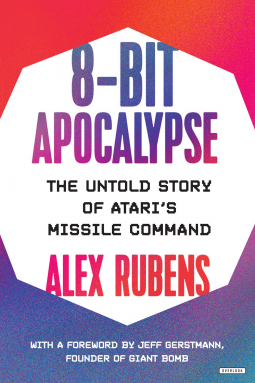
8-Bit Apocalypse
The Untold Story of Atari's Missile Command
by Alex Rubens
This title was previously available on NetGalley and is now archived.
Send NetGalley books directly to your Kindle or Kindle app
1
To read on a Kindle or Kindle app, please add kindle@netgalley.com as an approved email address to receive files in your Amazon account. Click here for step-by-step instructions.
2
Also find your Kindle email address within your Amazon account, and enter it here.
Pub Date Oct 16 2018 | Archive Date Sep 30 2018
The Overlook Press | Harry N. Abrams
Talking about this book? Use #8bitApocalypse #NetGalley. More hashtag tips!
Description
Available Editions
| EDITION | Other Format |
| ISBN | 9781468316445 |
| PRICE | $26.95 (USD) |
Featured Reviews
 Reviewer 153322
Reviewer 153322
As Atari conquered the video game market of the early 1980s, one programmer internalized the existential dread of the Cold War and produced Missile Command--a game built on three controllers and a trackball (a technology invented by the Canadian navy in the 1950s, which I didn't know), pitting the player against incoming nuclear warheads. Unlike most games at the time, you just couldn't win, only make the best of bad choices--a theme picked up by more recent games but alien at the time. Rubens tracks down the reclusive programmer, Atari executives, arcade owners and high scoring competitive gamers (Billy Mitchell is a gigantic jerk) to lay out the history of a game so steeped in 80s paranoia it has its own urban legends about being a CIA backed government recruiting tool.
 Book Trade Professional 489459
Book Trade Professional 489459
8-Bit Apocalypse is 1/3 history of Atari and 2/3 history of Missile Command / designer Dave Theurer. The opening section on Atari and all its hedonistic glory sets up converging elements: Cold War paranoia, the nascent wild west of the yet-to-be-formed video game industry, and the millions of dollars about to be poured into it by corporate America. That transitions into the need for new material (content) as the industry's founders moved onto different aspects of the business. Then enter Dave Theurer, who was tasked with creating some form of "satellite defense game." Just one problem -- during the height of Cold War fears, Theurer began to question the ethics of commercializing such an event.
Theurer, who rarely speaks out on his time as a game developer, worked with the author, along with quotes from other notable industry names from the time. The result is equal parts history lesson and personality profile of how the rigors of professional and external stress an impact a person. Highly recommend for anyone interested in the formative years of the video game industry, or even people interested in a different take on how the Cold War influenced popular culture.




